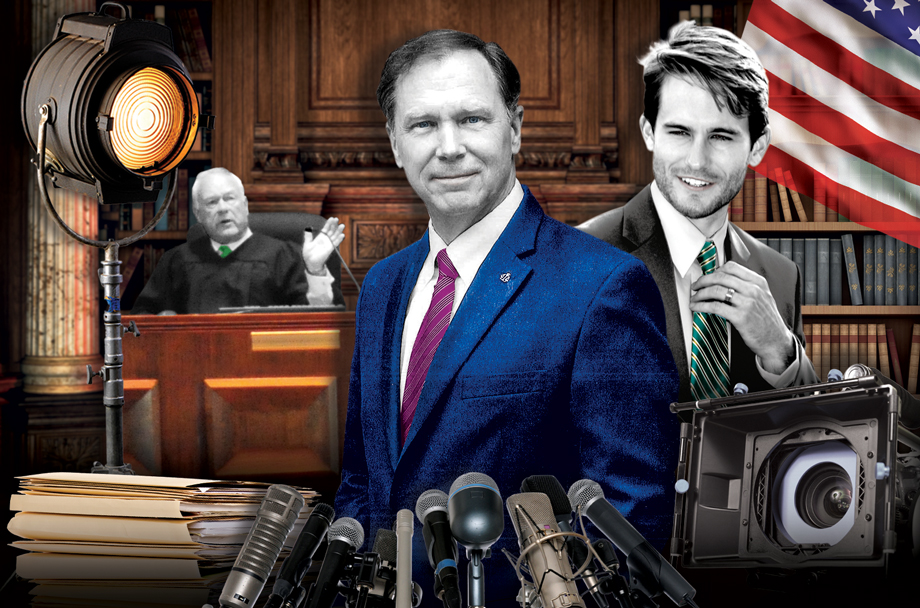
Illustration by Matt Herring
When life takes a turn for the dramatic, anyone can feel like the star of their own movie. Most people, though, will not go to the lengths Bill Lundy did to translate their experiences to the big screen. Lundy, a 57-year-old lawyer in northwest Georgia, spent $200,000 of his own money to write, direct, and star in what might be termed an “autobiopic” with flourishes of cinema verité. It’s a feature film titled A Larger Life. “I’m just playing myself,” he says. “I wouldn’t be able to play Nelson Mandela or an astronaut.”
The movie, filmed in Lundy’s home of Cedartown, relates the true story of a woman with cerebral palsy who died of starvation at a nursing home. Her weight dropped to 38 pounds, and she was covered with bedsores. Lundy won a lawsuit against the institution, resulting in the largest monetary damages—just under $10 million—awarded in Georgia in 2011. “This case brought attention to the mistreatment of the elderly and infirm,” Lundy says. “It was a story I needed to tell.”
The movie also showcases the gentle verities of small-town life. Lundy clearly loves his hometown, where one of his clients pays him with apple pies. “We all know each other, which keeps us honest, and we look after our eccentrics,” he says. A subplot celebrates the children’s theater program that Lundy started in Cedartown, where every kid is treated like a star—especially the ones who can’t carry a tune. “A film is a way to capture time,” Lundy says. “I want my descendants to be able to watch this movie and know what life was like for us: how we lived, how we fought, how we loved.”
A Larger Life, which takes its title from a Bible verse, also conveys how much scut work is required in the practice of law, the hours spent poring over dusty court records, the sharky machinations inside and outside the courtroom. “I wanted to present a jury trial the way it really is,” he says, “not the John Grisham way.”
The movie premiered last April at Midtown Art Cinema. “It’s the most accurate portrayal of a jury trial I’ve ever seen,” says attorney Linley Jones. “And the integrity that comes across from Bill is genuine. He’s given us another Atticus Finch.”
Yes, that is a mockingbird you hear. Lundy sets his film in the fictional town of Harper, Alabama, in homage to his favorite novel. The cast is an endearing mix of Lundy’s entire family and local yokels, playing themselves with hammy gusto, and a few professionals. Lundy also recruited Law & Order veteran Fred Thompson, a former U.S. senator who once practiced law. “I got a call and heard this deep voice say, ‘I don’t know where Cedartown, Georgia, is, but I’m coming there to make your movie,’” Lundy says. (The project turned out to be one of the last performances by Thompson, who died in November.)
Lundy also put out a casting call for a “28-year-old, Yankee-talking, Caucasian actor” and received 2,000 headshots. That brought him to New York, where he met with Todd Litzinger, who has appeared in 30 Rock. “When Bill pitched the story to me, he had so much passion, which sold me,” says Litzinger, who had never visited the South. When Lundy took him to a meat-and-three and filmed him eating Southern-style pinto beans for the first time, he captured a spontaneous reaction.
Lundy has never taken a film class, but he has worked as an extra in five movies and television shows filmed in Georgia. “I paid close attention to the set lights, the camera angles, the booms,” he says. “I would ask, ‘Why did you dolly backward, and what does “pull focus” mean?’ You can be the biggest sponge in the world if you love something.”
Lundy ended up with 25 hours of footage, which he spent a year editing. The result is a heartfelt and astonishingly polished testimony. “Bill really has an innate knack for filmmaking,” Litzinger says. “When we needed something, he could pull some strings to get it because he knows everybody in the town, in some cases has represented them, and they love him. He created real movie magic. I hope he keeps filming.”
Between trials, Lundy is working on three more scripts. “I don’t play golf,” he says. “What else am I going to do?”
This article originally appeared in our February 2016 issue under the headline “Lead Attorney.”














